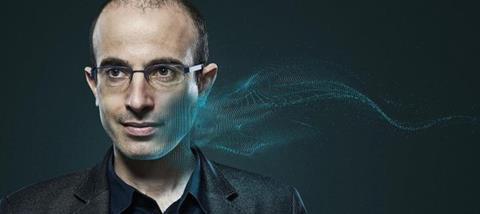
The Israeli historian Yuval Noah Harari is best known for his international bestsellers Sapiens: A Brief History of Humankind and Homo Deus: A Brief History of Tomorrow. He is from a secular Jewish background and is an advocate of a Buddhist form of meditation.
You might be wondering what on earth this 42 year old writer has to do with Christianity. After all, his work has been criticised for misrepresenting church history. Is he best ignored?
I believe Harari's work requires a Christian response. His work is immensely popular, yet its also deeply antithetical to Christian anthropology and eschatology.
As a historian, Harari examines the entirety of humanity’s past in order to identify future trends. The future that he considers possible (but which he does not advocate) is a worrying one, which should concern everyone, whether religious or not.
In Sapiens: A Brief History of Humankind, he argues that since 70,000 BC humanity has evolved in stages. Our imaginations, ability to farm, the development of the scientific method and the ability to cooperate in large political groups were all key markers in this process. Such extraordinary levels of knowledge and cooperation have led humans to call themselves homo sapiens, or wise humans.
The next great turning point in history according to Harari will be the transition from homo sapiens to homo deus (human-gods).
Human development thus far has been shaped by natural selection, but humanity has reached a level of knowledge and cooperation that will enable it to shape its own future. The next step is to acquire immortality, endless happiness and the ability to recreate bodies and minds. The wealthy elite who will monopolise the required technology will turn themselves into human gods and treat the rest of humanity as superfluous animals.
For us Christians, Harari’s estimations ought not to come as a surprise. The Bible reveals from its beginning that the greatest human problem is the desire to be like God. The serpent enticed Adam and Eve into eating from the tree of the knowledge of good and evil by assuring them that it would make them "like God, knowing good and evil" (Genesis 3:1-6).
The problem with wanting to be God-like is that it is supremely dangerous without a God-like morality to go with it. As Mary Shelley warns in her novel Frankenstein, inventions can go violently wrong if the creator is immature and egotistical.
The problem of mortality
Another part of humanity’s future foreseen by Harari is the re-engineering of bodies and minds. Human flesh could be combined with machines to create cyborgs. At the extreme, this could take the form of brain-computer interfaces which retain particular human consciousnesses and which render those consciousnesses 'everlasting' by attaching them to machines whose parts can be indefinitely replaced when they wear out. The problem of mortality is therefore solved for the privileged who will have access to this technical knowledge.
It's fascinating how keen some intellectuals are to solve the problem of morality. As Christians, we know that God himself has already made the far better offer of everlasting life. As the best-known passage in all of scripture makes clear: "For God so loved the world that he gave his only begotten Son, that whoever believes in him should not perish but have everlasting life’ (John 3:16).
This is a far superior vision of the future than that of a race of cyborgs! And the offer of everlasting life is made to all, and is not confined to a technocratic elite. The only condition to receiving it is believing that Jesus is the Son of God and that his death was payment for the debt of sin.
Rather than rely upon machines to replace the dying body, Christians can be confident that their bodies will be rescued and glorified (1 Corinthians 15:20). Therefore, Christianity promises continuity of identity with their mortal selves which the cyborg hybrid cannot.
To live always with the one who perfectly loves you is unimaginable contentment. On the other hand, a future that consists of a cyborg elite and a ‘useless’ mass of humanity is hell on earth.
The religion of Dataism
Harari defines Dataism as trust in huge amounts of computer-stored data that can be interrogated by algorithms in preference to consulting knowledgeable humans. Once Big Data knows humans better than they know themselves, humans will relinquish important decision-making to algorithms.
Harari is right to understand Dataism as a religion, for the ever-growing pool of data will appear omniscient. But Big Data is an idol. There is only one being who knows us completely (Matthew 10:30) and who is omniscient (Psalm 139:15-16). He is also the truth (John 14:6). It is better to be known by God our father than by algorithms created by humans whose motives are probably not our best interests.
Finally, if Harari is right and there is an attempt to be God-like on the part of humanity, it will be in defiance of the fact that a God-man already exists: Jesus Christ (John 5:18). The salvation of humanity does not lie in anything that humanity can do, but in what the God-man has done and will do. The most important question on history’s final day will then be not our algorithms’ accuracy, but whether we know him and he knows us (Matthew 7:21-23).
Dr Peter Harris is the writer of the soon to be published book, The Rage Against the Light: Why Christopher Hitchens Was Wrong. Follow him on Twitter @DrPeterHarris4






























